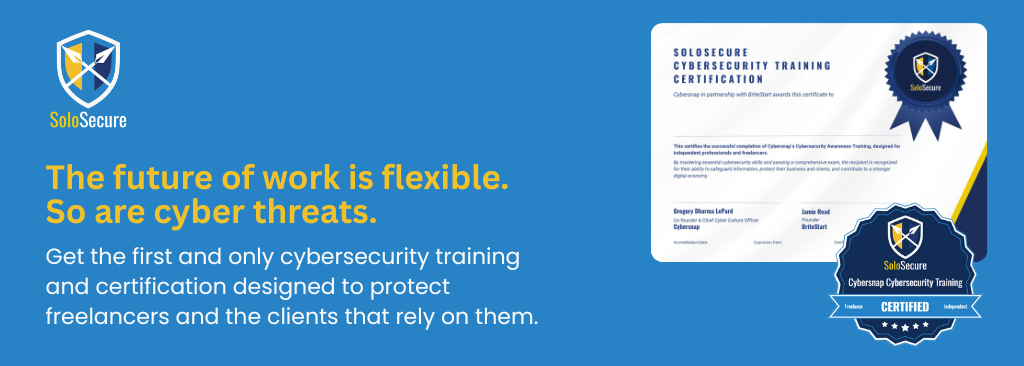The Rising Freelance Tide Amid Job Headwinds
Through BriteBirch Collective and our broader community of freelancers and solo business owners at BriteStart, we are always looking to the future of the flexible work model with a lens on the opportunities and threats on the horizon. With layoffs and a stale job market pushing more people to consider freelancing, there is a risk of exposure to cybercrime for both the contractor and the clients that hire them.
Canada’s labor market is facing turbulence: in August 2025, the economy shed 65,500 jobs, pushing the national unemployment rate to 7.1%, its highest outside the pandemic era since 2016. The hit was especially severe in professional, scientific, and technical services, suggesting a cascading effect on skilled work opportunities. At the same time, youth unemployment soared to 14.5%, the highest level since 2010 (excluding pandemic-levels), signaling fewer entry-level or full-time roles for emerging talent.
These conditions, while troubling, are fertile ground for the growth of the flexible work movement. In Canada, over 13% of workers were self-employed or freelancers in 2023, a number projected to rise further. Globally, freelancing is booming: as of mid-2025, about 1.57 billion people work independently, representing nearly 47% of the global workforce.
With fewer traditional jobs available, especially for young professionals, the shift to freelancing is accelerating. It’s a trend that has spurred BriteBirch Collective to launch BriteStart, a community focused on outfitting new solopreneurs with the skills and knowledge to be successful as solo business owners. It’s a trend that brings agility and flexibility to an evolving workforce, but it also brings new challenges and vulnerabilities if not managed well.
The Hidden Risks of a Freelancer-Driven Workforce
Freelancers often operate without the structured cybersecurity infrastructure of traditional employers. They may use personal devices, unsecured Wi-Fi, or lack clear guidance on safe data handling. This expands attack surfaces for the freelancer and for the companies they work with.
Worse, recent data from 2025 shows Canada has endured 12 billion detected cyberattacks, a stark indicator of escalating threats.
General cybersecurity research underpins that human error is behind the majority of breaches. IBM cites up to 95% of incidents stem from mistakes, like clicking phishing links or mishandling credentials. Additionally, surveys reveal 89% of organizations identify human error as their biggest cybersecurity challenge, highlighting poor habits and insufficient training as key culprits.
Why Businesses Must Share Accountability and Demand Training
1. Clear Expectations Yield Better Security
Freelancers are more likely to comply with cybersecurity training if it’s required upfront and transparently communicated, especially when they can factor it into their costs rather than perceiving it as unpaid labor.
2. Human-Focused Security Saves Businesses
Recent articles stress that technology alone isn’t enough. Businesses must weave continuous awareness training, simulations, and a security-first culture into their operations to reduce human-related risk.
3. Freelancers Are Receiving More Trust And Need More Training
As businesses increasingly embed freelancers into long-term or mission-critical workflows, these contractors are effectively team members. That elevates responsibilities on both sides.
Embed Cybersecurity in Freelance Agreements
- Include cybersecurity training as a contractual requirement for freelancers. Be explicit about what modules or certifications are mandatory.
- Allow training time to be billable. This ensures compliance and signals mutual respect.
- Use secure credential sharing tools, like password managers, to limit risk when granting system access.
- Run periodic phishing simulations or awareness refreshers, even with freelancers. Repeat exposure builds habits.
- Foster a security-conscious culture, treating cybersecurity as a shared responsibility, not just an IT checklist.
Building Freelance Resilience
Freelancing isn’t a passing trend, it’s a structural shift reshaping the workforce. As traditional roles vanish or evolve, independent professionals fill the gap and with them, both innovation and new vulnerabilities.
For businesses, the smart response is to integrate cybersecurity expectations clearly and early, ensuring freelancers become allies in, not loopholes to, cyber risk.

Introducing SoloSecure: Practical Certification for Freelancers
At BriteBirch, we believe freelancers deserve tools that help them thrive and businesses deserve peace of mind when they work with independent talent. That’s why we’re proud to support SoloSecure, the first cybersecurity awareness certification built specifically for freelancers and consultants.
SoloSecure offers:
- Focused, practical training designed around real freelancer workflows.
- A verifiable certificate and badge that demonstrates accountability to clients.
- Flexible, online delivery so professionals can certify on their own time.
Our next certification session is now open for registration.
Freelancers can take a critical step in protecting their businesses and strengthening client trust, while companies can begin encouraging the professionals they hire to meet a higher cybersecurity standard.
Sign up today for the upcoming SoloSecure Certification Session!



